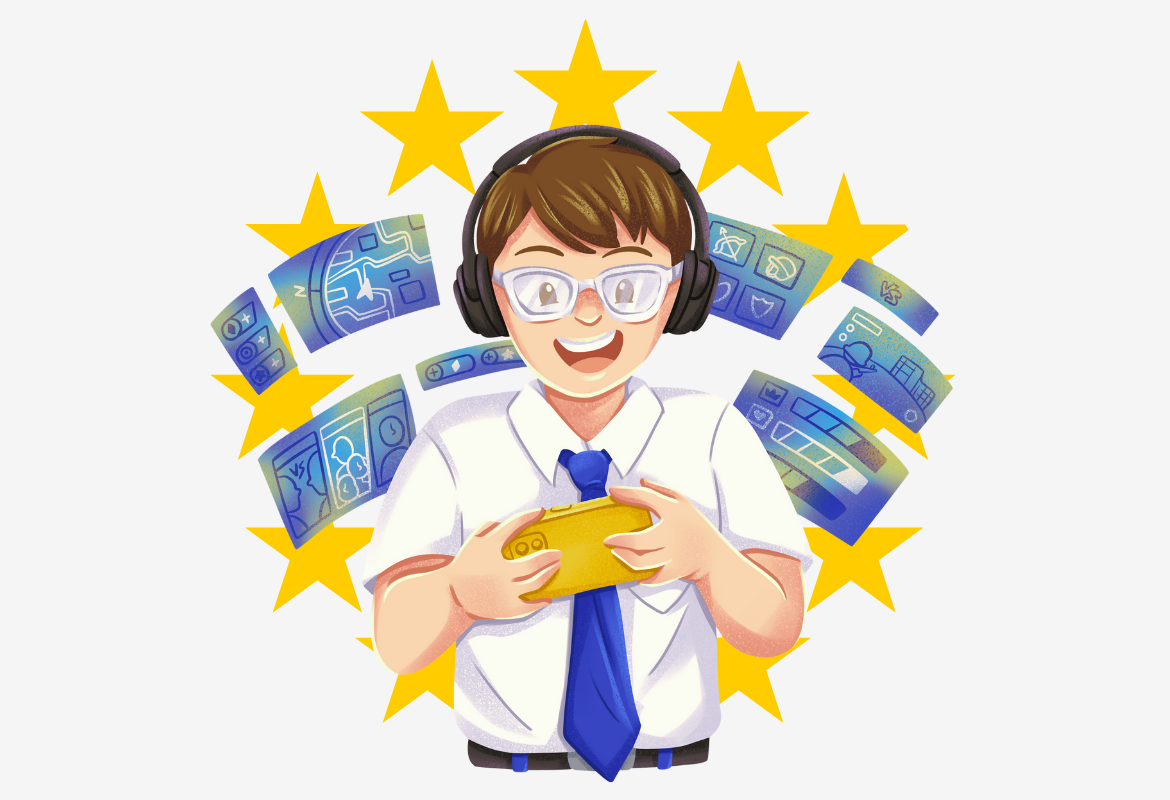In the current digital age, traditional teaching methods are no longer enough to engage the younger generation. As technology evolves rapidly, so does the world of education. One major innovation is the use of video games as a tool for education. Video games, long perceived as mere entertainment or violent distraction, have emerged as powerful tools for learning, offering a dynamic approach to education that resonates with today’s digitally stimulated youth.
The power of interactive learning
Engaging the youth of today with topics such as EU citizenship and democracy can be a difficult task. For youth workers and educators, the challenge is not only to teach the complexities of EU citizenship but also to make these lessons relevant and engaging. Video games can be used as a powerful tool by embedding civic education within a fun and immersive experience, increasing participation and enhancing retention.
The interactive nature of video games sets them apart from traditional methods as they place the learner at the centre of the experience rather than in a passive role. Instead of reading textbooks or listening to lectures, learners can engage with civic topics firsthand by making choices, solving problems, figuring things out for themselves, and experimenting with the impact of their actions. Video games offer immersive activities where players can emotionally connect with the meaning and consequences of democratic processes and civic acts in a controlled environment, safely exploring abstract concepts in a practical manner.
Game-based learning: Education through play
Game-based learning, the process of integrating educational goals into game experiences, has been steadily growing and proving its benefits. It introduces competition, challenge, achievement, and progression, which are key motivators that keep participants engaged while they learn about a variety of topics.
Additionally, the competitive aspect of videogames is not about winning in a traditional sense but about mastering concepts and achieving progress to reach a specific goal. In doing so, they can gain a deeper understanding of what it means to be an active, responsible citizen in the EU and the impact of EU policies and processes on citizens’ daily lives, without the pressure of traditional testing or exams.

Narrative-driven learning: Bringing democracy to life
As exemplified by the use of storytelling in early education, narrative-driven learning is central to how we understand the world, as learners put themselves in the main character’s shoes and grow alongside them. Through narrative video games, learners can explore the concepts of EU values, institutions, citizens’ rights and duties or sustainability in a playful and engaging manner, take on the role of political figures or diverse citizens, and even travel across history and beyond borders. In doing so, they are not just learning about the EU; they are living it and practising the consequences of democratic participation.
A new era for civic education
A revolution has been happening in education with the increasing use of gamification and game-based methods, shaping the future of civic education and promoting innovative and inclusive approaches. By leveraging the benefits of narrative-driven video games, we can engage young people in a meaningful exploration of democracy, EU values and citizenship and prepare young Europeans for the responsibilities and privileges that come with EU membership.
The EU Video Games project will take part in this revolution by equipping youth and youth workers with the tools to harness the power of educational video games to teach EU citizenship and democracy. Through accessible, non-coding methods, youth and youth workers will have access to pre-designed games and also gain the skills to create their own educational games, while improving their creativity, critical thinking and digital literacy, thus developing essential life skills.
Stay tuned for our upcoming resources and learn how to use and create educational video games to help the next generation of citizens shape the future of Europe!
References
Adžić, S., Al-Mansour, J., Naqvi, H. & Stambolić, S. (2021). The impact of video games on Students’ educational outcomes. In Entertainment Computing. University UNION – ArabOpen University, University of Hafr Al-Batin & University of Belgrade. https://doi.org/10.1016/j.entcom.2021.100412
Boudreau, E. (2021). Find Fun – How to recognize video games that engage kids of all ages in learning. Harvard Graduate School of Education. https://www.gse.harvard.edu/ideas/usable-knowledge/21/06/find-fun
Farreng, L. (2022). REPORT on esports and video games – A9-0244/2022. European Parliament. https://www.europarl.europa.eu/doceo/document/A-9-2022-0244_EN.html
Kuo, R. & Chang, M. (2019). Special Issue on “Guidelines and Taxonomy for Educational Game and Gamification Design”. In Journal of Educational Technology & Society, Volume 22, Issue 3. https://www.j-ets.net/collection/published-issues/22_3
Vitaut. (2022). Video games as a tool for civic education and activism. EENCE – Eastern European Network for Citizenship Education. https://eence.eu/2022/10/06/video-games-as-a-tool-for-civic-education-and-activism/



